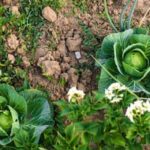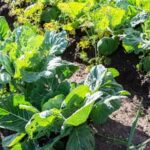Natural pesticides for vegetable gardens are essential in maintaining a healthy and thriving garden. It is crucial to understand the importance of using natural pesticides, especially when dealing with common pests that can cause significant damage to your vegetable plants.
Chemical pesticides can pose dangers not only to the environment but also to human health, making the use of natural alternatives a preferred option. In this article, we will explore the significance of natural pesticides in vegetable gardens, discuss common pests and the damage they can cause, and provide tips on how to effectively apply natural pest control methods.
Understanding the importance of using natural pesticides in vegetable gardens is vital for promoting sustainable and eco-friendly gardening practices. Not only do natural pesticides help protect your crops from harmful pests, but they also support a healthy ecosystem by avoiding the negative impacts associated with chemical pesticides. By embracing a healthy and eco-friendly approach to pest control, you can create a thriving garden that contributes to a more sustainable environment.
In addition to discussing the benefits of using natural pesticides over chemical alternatives, we will also delve into effective ways of creating your own natural pesticides at home. Furthermore, we will provide valuable tips for applying natural pesticides effectively and integrating companion planting and other natural pest control methods in your vegetable garden. With these practical insights, you can achieve optimal plant protection while promoting environmental stewardship.
Understanding the Importance of Using Natural Pesticides in Vegetable Gardens
In recent years, there has been a growing awareness of the importance of using natural pesticides in vegetable gardens. This shift in mindset is largely driven by the desire to promote environmental sustainability and protect the health of both humans and wildlife. Natural pesticides for vegetable gardens are derived from plant-based or mineral-based ingredients, making them safe and non-toxic alternatives to chemical pesticides.
One of the key reasons why natural pesticides are crucial for vegetable gardens is their minimal impact on the environment. Chemical pesticides can have detrimental effects on soil health, water quality, and non-target organisms. In contrast, natural pesticides break down more quickly and have lower toxicity levels, reducing the risk of long-term harm to ecosystems.
Furthermore, using natural pesticides in vegetable gardens promotes the production of healthy and nutritious crops. Unlike chemical pesticides that leave harmful residues on produce, natural pesticides offer a safer solution for controlling pests without compromising the quality of fruits and vegetables. By incorporating these natural alternatives into pest management strategies, gardeners can ensure that their homegrown produce is free from harmful chemicals.
| Aspect | Information |
|---|---|
| Impact on environment | Natural pesticides have minimal impact on soil health, water quality, and non-target organisms |
| Produce quality | Natural pesticides help produce healthy and nutritious crops without leaving harmful residues |
Common Pests in Vegetable Gardens and the Damage They Cause
Vegetable gardens are often targeted by a variety of pests that can cause significant damage to crops if left unchecked. Understanding the common pests and the damage they cause is essential for effective pest management in your garden. Here are some of the most prevalent pests and the havoc they wreak:
1. Aphids: These tiny insects feed on the sap of plants, causing leaves to curl, yellow, or distort. They can also transmit diseases from one plant to another.
2. Tomato Hornworms: These large green caterpillars feast on tomato plants, consuming leaves and fruits, which can lead to extensive damage if not addressed promptly.
3. Cabbage Worms: As their name suggests, cabbage worms attack brassica crops such as cabbage, broccoli, and cauliflower. They chew large holes in leaves, impairing plant growth and reducing yields.
4. Squash Bugs: These flat, brownish-black bugs target squash and pumpkin plants, piercing them with their mouthparts and causing wilting, yellowing, and eventual death of the plant.
5. Colorado Potato Beetles: These pests feed on potato plants and can defoliate them if not controlled, leading to reduced tuber production and overall plant health.
By familiarizing yourself with these common pests and the damage they cause, you can proactively implement natural pest control methods such as introducing beneficial insects or using natural pesticides for vegetable gardens to protect your crops from harm.
Remember that embracing an eco-friendly approach to pest control not only safeguards your garden’s health but also contributes to a sustainable environment for future generations while keeping harmful chemicals at bay. Next up we will go talk about the dangers of chemical pesticides versus the benefits of using natural alternatives as a more sustainable option for gardening enthusiasts looking for healthier solutions to treat their harvest.
The Dangers of Chemical Pesticides and the Benefits of Using Natural Alternatives
Chemical pesticides have long been used in agriculture to control pests and protect crops. However, the use of these chemicals comes with significant dangers that can have harmful effects on human health, the environment, and beneficial insects. The impact of chemical pesticides on the environment includes pollution of water sources, soil degradation, and harm to wildlife. Additionally, exposure to these chemicals has been linked to serious health issues such as cancer, reproductive problems, and neurological disorders.
In contrast, natural pesticides for vegetable gardens offer a safer alternative for pest control. These alternatives are derived from natural sources such as plants, minerals, or organisms and are less harmful to human health and the environment. By using natural pesticides, gardeners can reduce their exposure to toxic chemicals while promoting a healthier ecosystem in their vegetable gardens.
Benefits of Using Natural Pesticides
One of the main benefits of using natural pesticides for vegetable gardens is that they target specific pests without causing harm to beneficial insects such as bees, butterflies, and ladybugs. This selective approach helps maintain the ecological balance in the garden by preserving populations of pollinators and natural predators of pests. Furthermore, natural pesticides break down more quickly than synthetic chemicals and are less likely to accumulate in the environment.
Dangers of Chemical Pesticides
The use of chemical pesticides poses serious risks to human health through direct contact during application or consumption of contaminated produce. Studies have shown that prolonged exposure to chemical pesticides can lead to chronic health conditions such as respiratory problems, dermatitis, and even acute poisoning in severe cases.
Moreover, these chemicals can persist in the soil and water for extended periods, leading to long-term environmental damage.By understanding these dangers and recognizing the benefits of using natural alternatives, gardeners can make informed choices about pest management in their vegetable gardens.
Top 5 Natural Pesticides for Vegetable Gardens
When it comes to protecting your vegetable garden from pests, natural pesticides are the way to go. These alternatives to chemical pesticides not only effectively control pests but also help maintain the balance of your garden’s ecosystem. Here are five natural pesticides that can help you keep your vegetable garden healthy and pest-free.
Neem Oil
Derived from the seeds of the neem tree, neem oil is a powerful natural pesticide that helps control a wide range of pests such as aphids, whiteflies, and caterpillars. It works by disrupting the insect’s hormonal system and acts as a repellent, making it an effective tool for pest management in vegetable gardens.
Diatomaceous Earth
Diatomaceous earth is made from the fossilized remains of tiny aquatic organisms called diatoms. It works by physically damaging the exoskeletons of insects and dehydrating them, ultimately leading to their demise. This natural pesticide is particularly effective against slugs, snails, and beetles, making it an essential tool for organic pest control in vegetable gardens.
Garlic Spray
Garlic has natural insecticidal properties that make it an excellent choice for pest control in vegetable gardens. By blending garlic cloves with water and straining the mixture into a spray bottle, you can create a potent garlic spray that repels aphids, spider mites, and other common garden pests while not harming beneficial insects.
Pyrethrum
Pyrethrum is derived from certain species of chrysanthemum flowers and contains compounds that act as powerful insecticides. It targets a wide range of pests such as moths, flies, and mosquitoes without leaving harmful residues on vegetables or soil when used correctly.
Soap Spray
A simple mixture of liquid soap or detergent with water can be an effective natural pesticide for controlling soft-bodied insects like aphids, mealybugs, and spider mites in your vegetable garden. The soap disrupts the insects’ cell membranes and suffocates them upon contact.
These five natural pesticides offer effective alternatives to chemical pesticides for controlling pests in your vegetable garden while promoting environmental sustainability and maintaining the health of your plants. Incorporating these natural remedies into your pest management strategy can help you achieve a thriving vegetable garden without resorting to harmful chemicals.
How to Make Your Own Natural Pesticides at Home
Making your own natural pesticides at home can be a cost-effective and eco-friendly way to protect your vegetable garden from pests. Not only are these homemade remedies safe for you and the environment, but they also offer effective pest control without harming beneficial insects or contaminating your produce. Here are some simple recipes for natural pesticides that you can easily make at home:
- Garlic Spray: To make a garlic pesticide, simply blend together several cloves of garlic with water. Let the mixture sit overnight, then strain it and pour it into a spray bottle. This potent spray can deter various pests such as aphids, caterpillars, and beetles.
- Neem Oil Spray: Neem oil is derived from the seeds of the neem tree and has insecticidal properties. Mix a small amount of neem oil with water and a few drops of dish soap to create an effective pesticide against common garden pests like mites, whiteflies, and aphids.
- Chili Pepper Spray: Blend hot peppers with water and let the mixture steep for a day. Then strain the liquid and add it to a spray bottle. The capsaicin in chili peppers acts as a natural deterrent for insects such as ants, caterpillars, and beetles.
These simple DIY natural pesticide recipes are just a starting point for creating your own pest control solutions at home. Experiment with different ingredients based on your specific pest problems and remember to always test your homemade sprays on a small area of your plants before applying them more broadly. By making your own natural pesticides, you can take control of what goes into your garden while promoting a healthier ecosystem for both plants and beneficial insects.
Tips for Applying Natural Pesticides Effectively
When it comes to maintaining a healthy and thriving vegetable garden, the use of natural pesticides is essential for effectively managing common pests. However, simply using natural pesticides is not enough – proper application is key to ensuring their effectiveness in controlling pests while minimizing harm to beneficial insects and the environment.
One of the most important tips for applying natural pesticides effectively is to properly identify the pests that are causing damage in your vegetable garden. Different pests may require different types of natural pesticides or methods of application. By understanding which pests you are dealing with, you can choose the most appropriate natural pesticide and apply it more effectively.
Another crucial tip for applying natural pesticides is to follow the instructions provided on the product label or recipe. Natural pesticides come in various forms such as sprays, powders, or solutions, and each may have specific instructions for dilution ratios, application frequency, and timing. Following these instructions ensures that you are applying the pesticide in a safe and effective manner.
Lastly, consider using natural pest control methods in conjunction with natural pesticides for a comprehensive approach to pest management in your vegetable garden. Companion planting, crop rotation, and encouraging beneficial insects like ladybugs and lacewings can all contribute to reducing pest populations naturally without relying solely on pesticides.
| Tip | Description |
|---|---|
| Identify Pests | Properly identify the pests causing damage in your garden to choose appropriate natural pesticide. |
| Follow Instructions | Adhere to product label or recipe instructions to ensure safe and effective pesticide application. |
| Integrated Pest Management | Consider using combination of natural pest control methods alongside natural pesticides. |
Integrating Companion Planting and Other Natural Pest Control Methods in Vegetable Gardens
In addition to using natural pesticides for vegetable gardens, gardeners can also employ companion planting and other natural pest control methods to maintain the health of their plants. Companion planting involves growing certain plants together in order to deter pests, attract beneficial insects, or enhance the growth of neighboring plants.
For example, planting marigolds alongside vegetables can help repel nematodes and other harmful insects. Similarly, growing aromatic herbs like basil and dill near tomatoes can improve their flavor and ward off pests.
Aside from companion planting, vegetable gardeners can also utilize other natural pest control methods such as introducing beneficial insects like ladybugs and lacewings into the garden. These insects are natural predators of common garden pests such as aphids, mites, and caterpillars. Additionally, creating habitat for birds and installing bird feeders in the garden can encourage these feathered friends to help control insect populations.
Furthermore, maintaining a healthy soil ecosystem by regularly adding compost and organic matter can also promote the presence of beneficial organisms that suppress pest populations. This approach focuses on building up a strong and diverse ecosystem within the garden that naturally regulates pest levels without the need for harmful chemical pesticides. By combining natural pesticides for vegetable gardens with companion planting and other ecological pest management techniques, gardeners can create a thriving and balanced environment for their crops to flourish.
Conclusion
In conclusion, adopting a healthy and eco-friendly approach to pest control in your vegetable garden is not only beneficial for the environment but also for the health of your family and the overall productivity of your garden. By using natural pesticides for vegetable gardens, you can effectively manage common pests and minimize the damage they cause without exposing yourself, your loved ones, or the surrounding ecosystems to harmful chemicals.
Understanding the importance of using natural pesticides in vegetable gardens is crucial in promoting a balanced and sustainable ecosystem. It helps maintain the natural predators of pests while avoiding harm to beneficial insects such as bees, butterflies, and ladybugs. By embracing natural pest control methods, you contribute to preserving biodiversity and supporting ecological balance within your garden.
With the dangers of chemical pesticides well-documented, it is clear that opting for natural alternatives provides numerous benefits. The top 5 natural pesticides for vegetable gardens offer effective solutions without compromising on safety.
Additionally, learning how to make your own natural pesticides at home provides an affordable and customizable option for pest management. By integrating companion planting and other natural pest control methods into your gardening practices, you can further enhance the resilience of your vegetable garden against pests while maintaining a healthy and sustainable growing environment.
Frequently Asked Questions
What Is a Natural Pesticide for Vegetable Gardens?
A natural pesticide for vegetable gardens can be made using ingredients like neem oil, insecticidal soap, or oil sprays made from garlic and chili peppers. These products are effective at controlling pests without harming the environment.
How Do You Make Homemade Pesticide for Vegetables?
Homemade pesticide for vegetables can be made by combining simple ingredients like water, liquid dish soap, and essential oils such as peppermint or lavender. These natural remedies can help control pests while avoiding the use of harmful chemicals.
What Can I Use to Stop Bugs From Eating My Vegetable Plants?
To stop bugs from eating your vegetable plants, you can use natural deterrents like diatomaceous earth, which is a powder that can be sprinkled around the garden to deter insects. Additionally, introducing beneficial insects like ladybugs or lacewings can help keep pest populations in check without using pesticides.

If you’re looking to get into vegetable gardening, or are just looking for some tips on how to make your current garden better, then you’ve come to the right place! My name is Ethel and I have been gardening for years. In this blog, I’m going to share with you some of my best tips on how to create a successful vegetable garden.





